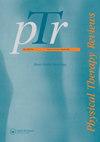运动训练干预对成年肾移植受者的影响:随机对照试验的系统综述和荟萃分析
IF 0.8
Q4 REHABILITATION
引用次数: 3
摘要
摘要背景肾移植受者的特点是身体素质和身体成分发生不良变化。移植后的管理涉及到身体活动,尽管运动效果的证据有限。目的评价运动训练干预对KTRs的影响。方法检索截至2021年3月的NCBI PubMed(MEDLINE)和CENTRAL(EMBASE,世界卫生组织ICTRP)数据库,以确定研究成人KTR运动训练的合格随机对照试验(RCT)。结果包括运动能力、力量、血压、身体成分、心率、血脂异常和肾功能标志物以及与健康相关的生活质量(QoL)。结果纳入16项随机对照试验,共827个KTR。干预的中位时间为14周,参与者每周锻炼2至7次。大多数研究采用有氧运动和阻力运动相结合的方法。观察到心肺功能(VO2峰值)有显著改善(3.21 ml/kg/min,p = 0.003),6MWT(76.3米,p = 0.009),身体功能(STS-60,4.8次重复,p = 0.04)和高密度脂蛋白(HDL)(0.13 mg/dL,p = 0.03)。观察到最大心率适度增加(p = 0.06)。肌酸酐也出现中度下降(0.14 mg/dl,p = 0.05)。独立研究报告了力量、骨骼健康、瘦体重和生活质量的改善。总体而言,研究具有较高的偏倚风险,提示发表偏倚。结论运动训练可以为成人KTR带来一些好处,特别是通过提高心肺功能和运动能力、力量、高密度脂蛋白水平、最大心率和改善生活质量。需要额外的长期大样本随机对照试验,包括需要运动和饮食行为改变的复杂干预措施,以充分了解运动对KTR的影响。本文章由计算机程序翻译,如有差异,请以英文原文为准。
The effect of exercise training interventions in adult kidney transplant recipients: a systematic review and meta-analysis of randomised control trials
Abstract Background Kidney transplant recipients (KTRs) are characterised by adverse changes in physical fitness and body composition. Post-transplant management involves being physically active, although evidence for the effect of exercise is limited. Objective To assess the effects of exercise training interventions in KTRs. Methods NCBI PubMed (MEDLINE) and CENTRAL (EMBASE, WHO ICTRP) databases were searched up to March 2021 to identify eligible randomized controlled trials (RCTs) that studied exercise training in adult KTRs. Outcomes included exercise capacity, strength, blood pressure, body composition, heart rate, markers of dyslipidaemia and renal function, and health-related quality of life (QoL). Results Sixteen RCTs, containing 827 KTRs, were included. The median intervention length was 14-weeks with participants exercising between 2–7x/week. Most studies used a mixture of aerobic and resistance exercise. Significant improvements were observed in cardiorespiratory function (VO2peak) (3.21 ml/kg/min, p = 0.003), 6MWT (76.3 meters, p = 0.009), physical function (STS-60, 4.8 repetitions, p = 0.04), and high-density lipoprotein (HDL) (0.13 mg/dL, p = 0.03). A moderate increase in maximum heart rate was seen (p = 0.06). A moderate reduction in creatinine was also observed (0.14 mg/dl, p = 0.05). Isolated studies reported improvements in strength, bone health, lean mass, and QoL. Overall, studies had high risk of bias suggestive of publication bias. Conclusions Exercise training may confer several benefits in adult KTRs, particularly by increasing cardiorespiratory function and exercise capacity, strength, HDL levels, maximum heart rate, and improving QoL. Additional long-term large sampled RCTs, incorporating complex interventions requiring both exercise and dietary behaviour change, are needed to fully understand the effects of exercise in KTRs.
求助全文
通过发布文献求助,成功后即可免费获取论文全文。
去求助
来源期刊

Physical Therapy Reviews
REHABILITATION-
CiteScore
1.30
自引率
0.00%
发文量
26
期刊介绍:
Physical Therapy Reviews is an international journal which aims to publish contemporary reviews, discussion papers and editorials within physical therapy, and in those basic and clinical sciences which are the basis of physical therapy. The journal is aimed at all those involved in research, teaching and practice within the area of physical therapy. Reviews (both descriptive and systematic) are invited in the following areas, which reflect the breadth and diversity of practice within physical therapy: •neurological rehabilitation •movement and exercise •orthopaedics and rheumatology •manual therapy and massage •sports medicine •measurement •chest physiotherapy •electrotherapeutics •obstetrics and gynaecology •complementary therapies •professional issues •musculoskeletal rehabilitation
 求助内容:
求助内容: 应助结果提醒方式:
应助结果提醒方式:


